52.1.4.5 (52 > 13)
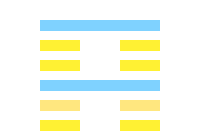
52.1.4.5 (52 > 13) - THE KĂN HEXAGRAM.
- 1. The first line, divided, shows its subject keep- ing his toes at rest. There will be no error; but it will be advantageous for him to be persistently firm and correct.
- 4. The fourth line, divided, shows its subject keeping his trunk at rest. There will be no error.
- 5. The fifth line, divided, shows its subject keeping his jawbones at rest, so that his words are (all) orderly. Occasion for repentance will disappear.
52.1.4.5 (52 > 13) - Stop
One is invested with a burden too heavy for one's skills.
Bing DeepL Google Yandex52.1.4.5 (52 > 13) - Stop
One is invested with a burden too heavy for one's skills.
Bing DeepL Google Yandex52.1.4.5 (52 > 13) - Kán, l’arrêt
Kán : ferme, tenir droit, bien réglé, arrêter, reposer
-
1. (On doit) tenir fermes ses pieds ; i. e. être toujours d’une ferme droiture.
Ne jamais perdre sa droiture. - 4. Tenir le corps droit et ferme, c’est une bonne manière. [On doit tenir le corps entier tout droit.] (Répétition du § 3 pour en avoir six. Tenir le corps droit est un principe essentiel des rites chinois.)
-
5. Tenir ses mâchoires de sorte que les paroles sortent de la bouche avec ordre et mesure, cela exempte de repentir.
On sait ainsi conserver le milieu.
52.1.4.5 (52 > 13) - Cesser
On est investi d'une charge trop lourde pour ses compétences.
Bing DeepL Google Yandex52.1.4.5 (52 > 13) - Megállás
- 1. Nem megy megnézni mit tesznek a többiek hogy kerülje a bajokat.
- 4. Megáll, de mások folytatják.
- 5. Nem fejti ki kételyeit hogy ne okozzon nehézségeket.
The trigrams
The trigrams are combinations of three yin and yang lines. The three bottom lines of the hexagram form the lower trigram and represent the inner situation. The three top lines form the upper trigram and represent the outer situation.
Upper trigram: The mountain The sky


Lower trigram: The mountain The fire


The formation: 52
What is already there

52 - THE KĂN HEXAGRAM.
When one's resting is like that of the back, and he loses all consciousness of self; when he walks in his courtyard, and does not see any (of the persons) in it, there will be no error.
Bing DeepL Google Yandex52 - Stop
One recognizes that it is time to stop because one needs to feed oneself.
Bing DeepL Google Yandex52 - Stop
One recognizes that it is time to stop because one needs to feed oneself.
Bing DeepL Google Yandex52 - Kán, l’arrêt
Kán : ferme, tenir droit, bien réglé, arrêter, reposer
Kan « ferme ». L’homme ferme tourne le dos et s’oppose résolument, sans tenir compte de lui-même. S’il traverse un endroit, il ne regarde pas qui y est et ne faillit point.
Texte
L’homme ferme s’oppose résolument (au mal) sans tenir compte de lui-même. Devant traverser un endroit, il ne regarde pas qui s’y trouve (mais le fait résolument) et ne faillit point.
Symbolisme
Deux montagnes superposées forment le Koua. Ainsi l’homme supérieur pense à ne pas dépasser les bornes de ses fonctions.
Commentaire
Kán signifie s’arrêter, tenir ferme, en bon ordre, agir ou s’arrêter selon l’occasion. Quand l’acte et sa cessation ont lieu en temps convenable, la conduite est belle et intelligente. « Rester à sa place », cela veut dire que les grands et les petits sont en rapport, mais sans usurpation ni entre-croisement. Celui qui est ferme et attentif à son devoir ne se recherche pas lui-même. Marchant dans son jardin, il ne voit pas même qui s’y trouve.
Note. Tout ceci illustre le sens « tenir droit, bien réglé » et se réfère aux rites du maintien extérieur qui prescrivent de se tenir toujours droit et de ne pas même s’asseoir sur un siège qui n’est pas droit.
52 - Cesser
On reconnaît qu'il est temps de s'arrêter car on a besoin de s'alimenter.
Bing DeepL Google Yandex52 - Megállás
Felismeri hogy itt az ideje megállni mert a többieket táplálni kell.
Bing DeepL Google Yandex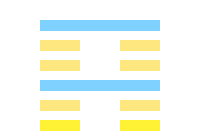
52.1 (52 > 22) - THE KĂN HEXAGRAM.
The first line, divided, shows its subject keep- ing his toes at rest. There will be no error; but it will be advantageous for him to be persistently firm and correct.
Bing DeepL Google Yandex52.1 (52 > 22) - Dropping one's probe
One is not going to see what others are doing, to avoid trouble.
Bing DeepL Google Yandex52.1 (52 > 22) - Dropping one's probe
One is not going to see what others are doing, to avoid trouble.
Bing DeepL Google Yandex52.1 (52 > 22) - Kán, l’arrêt
Kán : ferme, tenir droit, bien réglé, arrêter, reposer
(On doit) tenir fermes ses pieds ; i. e. être toujours d’une ferme droiture.
Ne jamais perdre sa droiture.
52.1 (52 > 22) - Renoncer à son enquête
On ne va pas voir ce que font les autres, pour éviter les ennuis.
Bing DeepL Google Yandex52.1 (52 > 22) - Megállás
Nem megy megnézni mit tesznek a többiek hogy kerülje a bajokat.
Bing DeepL Google Yandex
52.4 (52 > 56) - THE KĂN HEXAGRAM.
The fourth line, divided, shows its subject keeping his trunk at rest. There will be no error.
Bing DeepL Google Yandex52.4 (52 > 56) - Kán, l’arrêt
Kán : ferme, tenir droit, bien réglé, arrêter, reposer
Tenir le corps droit et ferme, c’est une bonne manière. [On doit tenir le corps entier tout droit.] (Répétition du § 3 pour en avoir six. Tenir le corps droit est un principe essentiel des rites chinois.)
Bing DeepL Google Yandex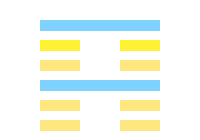
52.5 (52 > 53) - THE KĂN HEXAGRAM.
The fifth line, divided, shows its subject keeping his jawbones at rest, so that his words are (all) orderly. Occasion for repentance will disappear.
Bing DeepL Google Yandex52.5 (52 > 53) - Hiding one's concern
One does not express doubts so as not to create difficulties.
Bing DeepL Google Yandex52.5 (52 > 53) - Hiding one's concern
One does not express doubts so as not to create difficulties.
Bing DeepL Google Yandex52.5 (52 > 53) - Kán, l’arrêt
Kán : ferme, tenir droit, bien réglé, arrêter, reposer
Tenir ses mâchoires de sorte que les paroles sortent de la bouche avec ordre et mesure, cela exempte de repentir.
On sait ainsi conserver le milieu.
52.5 (52 > 53) - Dissimuler son inquiétude
On n'exprime pas ses doutes pour ne pas créer de difficultés.
Bing DeepL Google Yandex52.5 (52 > 53) - Megállás
Nem fejti ki kételyeit hogy ne okozzon nehézségeket.
Bing DeepL Google YandexIn the making: 13
What is poised to happen

13 - THE THUNG ZĂN HEXAGRAM.
Thung Zăn (or ‘Union of men’) appears here (as we find it) in the (remote districts of the) country, indicating progress and success. It will be advantageous to cross the great stream. It will be advantageous to maintain the firm correctness of the superior man.
Bing DeepL Google Yandex13 - Company
Making oneself available. Disregarding one's opinions. A general agreement is unlikely.
Bing DeepL Google Yandex13 - Company
Making oneself available. Disregarding one's opinions. A general agreement is unlikely.
Bing DeepL Google Yandex13 - T’ong, la compagnie fraternelle des hommes
T’ong : union, harmonie.
Texte
Si les hommes vivent en concorde dans un pays, il prospérera ; on y traversera les grandes difficultés. Le sage atteindra aisément sa perfection.
Symbolisme
La bonté, obtenant les dignités, gardant le milieu et s’accordant avec le ciel, forme le T’ong yin. Le feu sous le ciel forme l’hexagramme. Par leur vertu, le sage connaît la nature des choses et en saisit le tout harmonique (Shan y erh tchi t’ong). Le feu éclaire le ciel, le fait connaître.
Commentaire
Nous voyons ici l’effet de l’action du ciel. La force mêlée d’habileté et de perspicacité, observant la justice. Ainsi l’homme supérieur est bon et juste, et pénètre la pensée de tout ce qui est sous le ciel. Ainsi règne l’union.
13 - La compagnie
Se rendre disponible. Ne pas tenir compte de ses opinions. Une entente générale est peu probable.
Bing DeepL Google Yandex13 - Társulás
Önmaga elérhetővé tétele. A saját véleményt figyelmen kívül kell hagyni. Az általános egyetértés lehetetlen.
Bing DeepL Google YandexThe nuclear hexagram: 40.3.5.6 (40 > 44)
The nuclear hexagram is the association of the two inner trigrams (lines 2,3,4 and 3,4,5). It represents the root, or the origin of the situation.
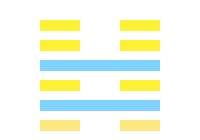
40.3.5.6 (40 > 44) - THE KIEH HEXAGRAM.
- 3. The third line, divided, shows a porter with his burden, (yet) riding in a carriage. He will (only) tempt robbers to attack him. However firm and correct he may (try to) be, there will be cause for regret.
- 5. The fifth line, divided, shows (its subject), the superior man ( = the ruler), executing his function of removing (whatever is injurious to the idea of the hexagram), in which case there will be good fortune, and confidence in him will be shown even by the small men.
- 6. In the sixth line, divided, we see a feudal prince (with his bow) shooting at a falcon on the top of a high wall, and hitting it. (The effect of his action) will be in every way advantageous.
40.3.5.6 (40 > 44) - Suspecting a lack of attention
One realises that others are not going to do what they have been asked to do.
Bing DeepL Google Yandex40.3.5.6 (40 > 44) - Suspecting a lack of attention
One realizes that others are not going to do what they have been asked to do.
Bing DeepL Google Yandex40.3.5.6 (40 > 44) - Kieh, la libération
Kieh : 1. Délivrer, faire échapper, échapper au danger ; 2. Disperser ; 3. Ouvrir, séparer, s’ouvrir. Se dit du mouvement de la germination. 4. Résoudre une difficulté, une complication.
-
3. Si un porteur se met dans un char et qu’il survienne des voleurs, il sera attaqué et échappera difficilement ; s’il abandonne sa charge, il pourra se sauver.
Pour un porteur, aller en char est honteux ; c’est attirer sur soi les voleurs.
Il n’appartient pas à des gens du commun d’aller en char . - 5. C’est au sage d’écarter (les maux) et de résoudre (les difficultés) ; s’il y réussit, il gagnera la confiance du vulgaire.
- 6. Si le prince est assez habile pour atteindre d’une flèche un faucon posé sur le haut d’un mur élevé, il aura le succès et saura disperser les rebelles.
40.3.5.6 (40 > 44) - Soupçonner un manque d'attention
On réalise que les autres ne vont pas faire ce qu'on leur a demandé.
Bing DeepL Google Yandex40.3.5.6 (40 > 44) - Módosítás
- 3. Ha valaki elhanyagolja, másoknak adja.
- 5. Csak egy alkalmas személy tudja megmutatni a megoldást.
- 6. Miután felkészül, meg tudja oldani a problémákat időben.
Ruler
The starting situation

52.5 (52 > 53) - THE KĂN HEXAGRAM.
The fifth line, divided, shows its subject keeping his jawbones at rest, so that his words are (all) orderly. Occasion for repentance will disappear.
Bing DeepL Google Yandex52.5 (52 > 53) - Hiding one's concern
One does not express doubts so as not to create difficulties.
Bing DeepL Google Yandex52.5 (52 > 53) - Hiding one's concern
One does not express doubts so as not to create difficulties.
Bing DeepL Google Yandex52.5 (52 > 53) - Kán, l’arrêt
Kán : ferme, tenir droit, bien réglé, arrêter, reposer
Tenir ses mâchoires de sorte que les paroles sortent de la bouche avec ordre et mesure, cela exempte de repentir.
On sait ainsi conserver le milieu.
52.5 (52 > 53) - Dissimuler son inquiétude
On n'exprime pas ses doutes pour ne pas créer de difficultés.
Bing DeepL Google Yandex52.5 (52 > 53) - Megállás
Nem fejti ki kételyeit hogy ne okozzon nehézségeket.
Bing DeepL Google YandexCorrection
The direction where the ruler is going to bend
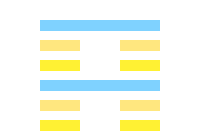
52.1.4 (52 > 30) - THE KĂN HEXAGRAM.
- 1. The first line, divided, shows its subject keep- ing his toes at rest. There will be no error; but it will be advantageous for him to be persistently firm and correct.
- 4. The fourth line, divided, shows its subject keeping his trunk at rest. There will be no error.
52.1.4 (52 > 30) - Stop
One returns to one's allies to ask them if they want to continue the fight.
Bing DeepL Google Yandex52.1.4 (52 > 30) - Stop
One returns to one's allies to ask them if they want to continue the fight.
Bing DeepL Google Yandex52.1.4 (52 > 30) - Kán, l’arrêt
Kán : ferme, tenir droit, bien réglé, arrêter, reposer
-
1. (On doit) tenir fermes ses pieds ; i. e. être toujours d’une ferme droiture.
Ne jamais perdre sa droiture. - 4. Tenir le corps droit et ferme, c’est une bonne manière. [On doit tenir le corps entier tout droit.] (Répétition du § 3 pour en avoir six. Tenir le corps droit est un principe essentiel des rites chinois.)
52.1.4 (52 > 30) - Cesser
On retourne vers ses alliés pour leur demander si ils veulent poursuivre la lutte.
Bing DeepL Google Yandex52.1.4 (52 > 30) - Megállás
- 1. Nem megy megnézni mit tesznek a többiek hogy kerülje a bajokat.
- 4. Megáll, de mások folytatják.

